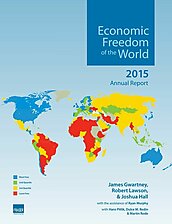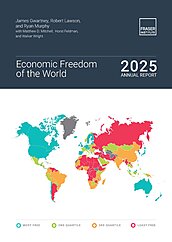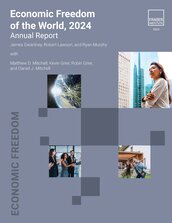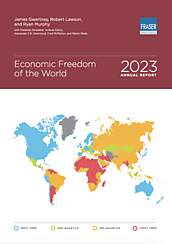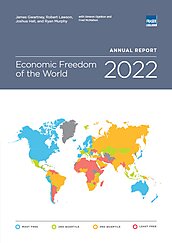Global economic freedom increased slightly in this year’s report, but remains below its peak level of 6.92 in 2007. The average score increased to 6.86 in 2013, the most recent year for which data is available. In this year’s index, Hong Kong retains the highest rating for economic freedom, 8.97 out of 10. The rest of this year’s top scores are Singapore, 8.52; New Zealand, 8.19; Switzerland, 8.16; United Arab Emirates, 8.15; Mauritius, 8.08; Jordan, 7.93; Ireland, 7.90; Canada, 7.89; and the United Kingdom and Chile at 7.87.
The United States, once considered a bastion of economic freedom, now ranks 16th in the world with a score of 7.73. Due to a weakening rule of law, increasing regulation, and the ramifications of wars on terrorism and drugs, the United States has seen its economic freedom score plummet in recent years, compared to 2000 when it ranked second globally.
The rankings of other large economies in this year’s index are Japan (26th), Germany (29th), South Korea (39th), Italy (68th), France (70th), Mexico (93st), Russia (99th), China (111th), India (114th), and Brazil (118th).
Nations in the top quartile of economic freedom had an average per capita GDP of US$38,601 in 2013, compared to US$6,986 for bottom quartile nations. Moreover, the average income of the poorest 10% in the most economically free nations is about 50% greater than the overall average income in the least free nations. Life expectancy is 80.1 years in the top quartile compared to 63.1 years in the bottom quartile, and political and civil liberties are considerably higher in economically free nations than in unfree nations.
